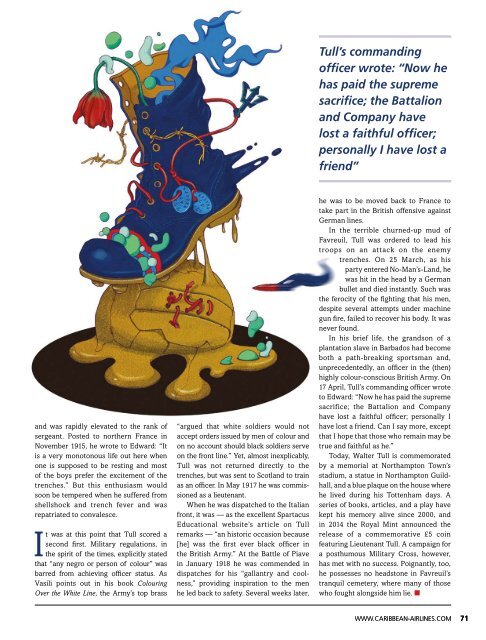Create successful ePaper yourself
Turn your PDF publications into a flip-book with our unique Google optimized e-Paper software.
Tull’s commanding<br />
officer wrote: “Now he<br />
has paid the supreme<br />
sacrifice; the Battalion<br />
and Company have<br />
lost a faithful officer;<br />
personally I have lost a<br />
friend”<br />
and was rapidly elevated to the rank of<br />
sergeant. Posted to northern France in<br />
November 1915, he wrote to Edward: “It<br />
is a very monotonous life out here when<br />
one is supposed to be resting and most<br />
of the boys prefer the excitement of the<br />
trenches.” But this enthusiasm would<br />
soon be tempered when he suffered from<br />
shellshock and trench fever and was<br />
repatriated to convalesce.<br />
It was at this point that Tull scored a<br />
second first. Military regulations, in<br />
the spirit of the times, explicitly stated<br />
that “any negro or person of colour” was<br />
barred from achieving officer status. As<br />
Vasili points out in his book Colouring<br />
Over the White Line, the Army’s top brass<br />
“argued that white soldiers would not<br />
accept orders issued by men of colour and<br />
on no account should black soldiers serve<br />
on the front line.” Yet, almost inexplicably,<br />
Tull was not returned directly to the<br />
trenches, but was sent to Scotland to train<br />
as an officer. In May 1917 he was commissioned<br />
as a lieutenant.<br />
When he was dispatched to the Italian<br />
front, it was <strong>—</strong> as the excellent Spartacus<br />
Educational website’s article on Tull<br />
remarks <strong>—</strong> “an historic occasion because<br />
[he] was the first ever black officer in<br />
the British Army.” At the Battle of Piave<br />
in January 1918 he was commended in<br />
dispatches for his “gallantry and coolness,”<br />
providing inspiration to the men<br />
he led back to safety. Several weeks later,<br />
he was to be moved back to France to<br />
take part in the British offensive against<br />
German lines.<br />
In the terrible churned-up mud of<br />
Favreuil, Tull was ordered to lead his<br />
troops on an attack on the enemy<br />
trenches. On 25 <strong>March</strong>, as his<br />
party entered No-Man’s-Land, he<br />
was hit in the head by a German<br />
bullet and died instantly. Such was<br />
the ferocity of the fighting that his men,<br />
despite several attempts under machine<br />
gun fire, failed to recover his body. It was<br />
never found.<br />
In his brief life, the grandson of a<br />
plantation slave in Barbados had become<br />
both a path-breaking sportsman and,<br />
unprecedentedly, an officer in the (then)<br />
highly colour-conscious British Army. On<br />
17 <strong>April</strong>, Tull’s commanding officer wrote<br />
to Edward: “Now he has paid the supreme<br />
sacrifice; the Battalion and Company<br />
have lost a faithful officer; personally I<br />
have lost a friend. Can I say more, except<br />
that I hope that those who remain may be<br />
true and faithful as he.”<br />
Today, Walter Tull is commemorated<br />
by a memorial at Northampton Town’s<br />
stadium, a statue in Northampton Guildhall,<br />
and a blue plaque on the house where<br />
he lived during his Tottenham days. A<br />
series of books, articles, and a play have<br />
kept his memory alive since 2000, and<br />
in 2014 the Royal Mint announced the<br />
release of a commemorative £5 coin<br />
featuring Lieutenant Tull. A campaign for<br />
a posthumous Military Cross, however,<br />
has met with no success. Poignantly, too,<br />
he possesses no headstone in Favreuil’s<br />
tranquil cemetery, where many of those<br />
who fought alongside him lie. n<br />
WWW.CARIBBEAN-AIRLINES.COM 71


















